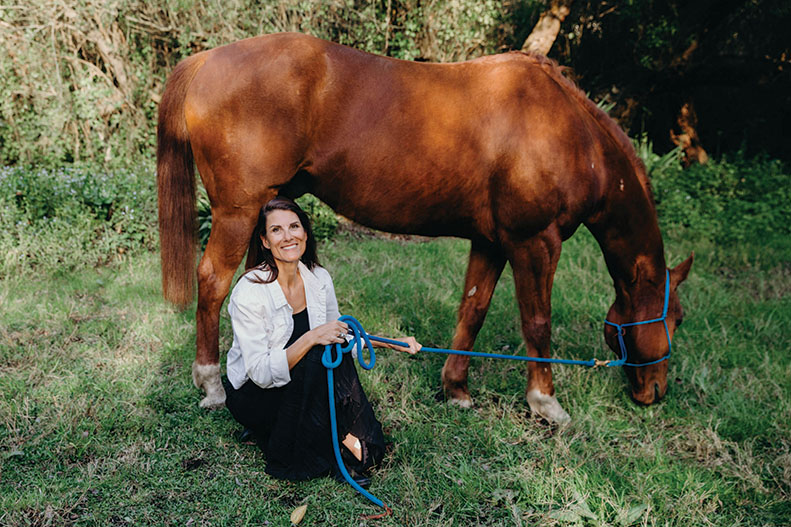
Scholars have long disputed at what point in history humans domesticated the horse. One theory holds that these majestic animals were first bred and trained for use as transportation in Eurasia around 2200 B.C. Although technology has largely sidelined the use of several species of Equus ferus caballus as beasts of burden, in recent years, psychologists have learned that horses have a remarkable ability to connect with humans on an emotional level. One Carmel Valley therapist, Jennifer Fenton, LMFT, recognized that facility and founded the Equine Healing Collaborative (EHC), a nonprofit organization that connects clients with therapists and equines, forming symbiotic relationships that benefit both human and horse.
Fenton gained an innate understanding of horse culture early in life, owning horses as a child in her hometown of Bishop, California. “While practicing as a marriage and family counselor, I became certified in Equine Massage Therapy,” she says. That’s when she hit upon the idea of using horses in therapy, recognizing the healing power of merely being in close proximity to these highly intelligent beings. She found those relationships helped to alleviate the tension of what can be a stressful occupation. That realization led her to the idea of a collaborative that put patients together with therapists and horses. “It started with just me and one horse. Today we have 40 part-time therapists and a total of 35 horses in three facilities.”
The horses—and miniature horses, ponies and donkeys—each have their own stories to tell and are all rescues, donations or surrenders. Many have troubled and traumatic pasts. “Some were abused, some are elderly and unable to do the work they were used for,” Fenton says. For instance, Frank, a stunningly handsome former racing thoroughbred, suffers from anxiety. “He is typically paired with a client with a similar clinical presentation.” Chili was loaded onto a truck on the way to slaughter. A compassionate woman saw that she was so ill she wouldn’t survive the trip, rescued her, brought her back to health and subsequently donated her to EHC, where she now happily grazes and receives excellent care, both physical and emotional. Mother and son donkeys, Rita and Beaux, are the perfect duo to work with family therapy clients.
None of the horses at EHC are now ridden. “In nature, horses are prey animals,” Fenton explains, “and we are hunters, so the natural instinct is for them to view us as a threat.” It turns out that mountain lions—another species with a history of preying on horses—approach horses in the same manner as humans do, jumping on their backs to attack. “When someone is sitting on a horse, the animal’s prey instincts kick in and they feel threatened. We want our horses to have choices. We want them to come to us of their own volition. This creates trust and more desire for connection.” And it works. These animals are profoundly empathetic. “Their instinct is to look at us warily and they can sense and feel everything about us. No other animal possesses that ability to desire to connect with us on a deep level.”
EHC’s operating funds are generated by billing insurance companies and through patients paying a sliding scale of fees. At any given time, EHC serves around 350 people, both individually and in groups. “We reached more than 900 patients in 2021,” Fenton says, “and 75 percent were at or below the poverty line.” EHC is partnered with several other area organizations, including Gathering for Women, Door to Hope, Monterey County Child Protective Services and the Monterey Peninsula Unified School District.
“We are a mental health service,” Fenton explains. “All clinicians are licensed or license eligible marriage and family therapists and clinical social workers.” She says that EHC is a safe place where those in need of help can find it in a peaceful and supportive atmosphere. “I have been practicing marriage and family therapy since 2006 and was licensed in 2012. I can honestly say that I’ve never seen results like the ones we achieve here.”
For more information about Equine Healing Collaborative, please visit www.equinehealing.org or call 831/582-1017.